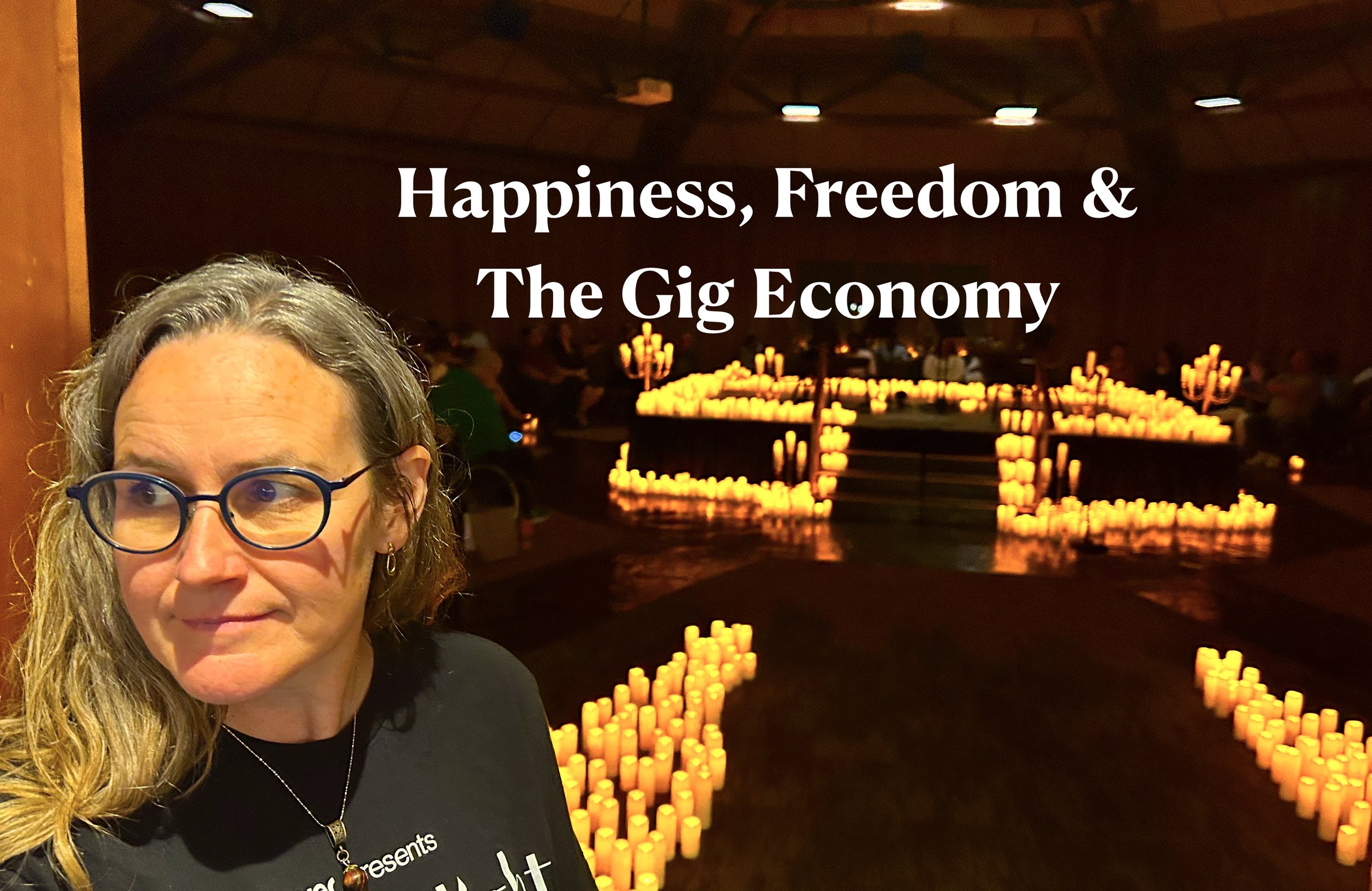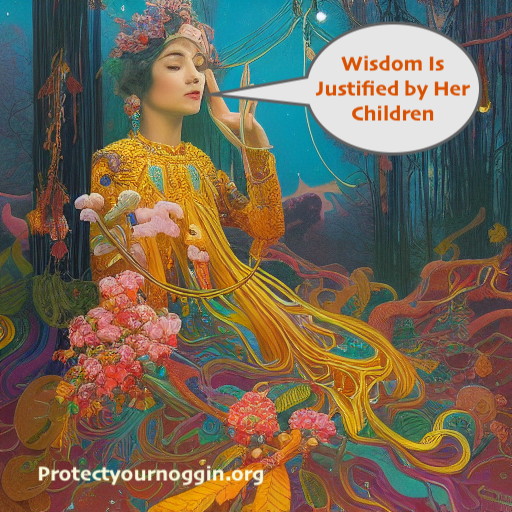How might working with the gig economy factor into the pursuit of happiness and freedom? What are the similarities and differences between the Aristotelian tradition on happiness and that of Lao Tzu?
Read MoreSinger and songwriter Jenna joins us to discuss finding one's voice and addressing life traumas with the healing medicine of music. We share her newly released single "Trigger" which is now available online.
Read MoreThe warrior archetype and why peace loving people might need to be ready to be more engaged on behalf of vulnerable groups in our precarious times. Part one is a general discussion of the theme and what the Tao Te Ching teaches about engagement with an enemy. Part two surveys some current events that arguably require a warrior's perspective.
Read MoreStacie leads us through three chapters from the Tao Te Ching that discuss the mysterious mother. What does this archetype and symbol say about our perspectives on femininity, society and the sacred? How does this differ from traditional American evangelical views of women and feminine characteristics of the divine? Is there a difference between being a source and being a creator? How can we let children and the things we cultivate grow spontaneously rather than through our constant control?
Read MoreA reflection on the power of receptivity as illustrated by the valley, which is an important symbol throughout the Tao Te Ching and philosophical Taoism. This is also an episode about the power of yin, and the concept of the mother goddess.
Read MoreReflecting in the wake of a wave of border traffic, Jeff and Stacie explore how what's going on at the US's southern border illustrates a global sickness that will continue to lead to immigration and refugee crises around the world. Couple capitalism with climate change and we can only expect more human suffering along borders for generations to come--that is, if we have generations to spare and unless we recognize that another world is possible.
Read MoreThe path. The way. The journey. Such concepts shift our focus from dogma and religious hierarchies, which helps us get out of the way of the way (tao). Behind all of this is a discussion of Guy Debord, the Situationists,the dérive, and psychogeography. We explore meditation through wandering and walking, the importance of attending to space, looking for synchronicities in our environment, and recognizing the ways in which capitalist society separates us from direct experience and connections with each other. Mindfulness techniques like aboriginal walkabouts, prayer labyrinths and religious pilgrimages can be powerful tools for emancipation.
Read MoreThe importance of natural wood (also rendered as the uncarved block) and undyed or unbleached silk for aesthetics and mindfulness techniques in the ancient Taoist tradition. What does this have to say for meditation practices within our modern anxieties, clothing, and values? It may seem too simple, but contemplating nature has strong medicinal value for our ailing times.
Read MoreA look at the over-promised land: political turmoil surrounding Benjamin Netanyahu, American attitudes about Israel and Palestine, Dispensationalism, and Orthodox services in the Holy Land.
Read MoreWhy does the invasion of Ukraine matter? How does the history of religion and anarchism intersect with this question? How does this relate to the persecution of trans people in the US? How ought we confront seemingly endless threats to liberty in our world? We discuss these and other currently-relevant questions that require a bit of historical backstory.
Read MoreWe examine the significance of the symbol of a twisted tree described in the Taoist text known as the Zhuangzi (Chuang Tzu) and a related set of stories about deformed sages. This is a discussion about recognizing the beauty and intrinsic value of things and people who might seem unimportant at first glance. It’s also a conversation about why we shouldn’t trust in the wisdom of people, institutions, and political ideologies who despise those with disabilities.
Read MoreThe Great Peng is a mythical bird that transforms from a giant fish and then into a winged beast that can fly for a year and a half, to the southern sea, stirring up the oceans and propelling the cycles of nature. The cicada and the dove are skeptical about this massive bird’s existence, since they can’t comprehend how it could fly so far and so high and be so huge. They think it would take too much flapping. But the Great Peng floats on the vast warm air, without struggling. It is the opening image of the great Taoist Classic The Chunk Tzu. When contemplating this image, you will do well to contemplate one or more of the following questions. Where in your life do you need to restore a sense of proportion? Are you feeling too small for the great task ahead of you? You might need to be compassionate on yourself and recognize the limitations of your current resources. Or, might you be in need of higher perspective? Consider starting or increasing your meditative practice. Maybe try out a new technique to help you gain perspective. Finally, is there a way that you can do less work but rise up on the powerful resources you already have?
Read MoreWe discuss the concept of the inner alchemist, which is a metaphor for the process of spiritual transformation. First, Jeff sets up the conversation with some historical background about failed Western alchemists like Anna Maria Zieglerin (1550-75) and the demise of Chinese emperors who drank what they thought was the elixir of life, then Stacie and Sydnie join in to riff on the ways in which inner alchemy can help us navigate a sort of outer alchemy: the chemicals and plants we take into our bodies. We also talk about the ways in which we can transform the elements of our lives even in difficult times.
Read MoreCasual reflections on Jesus’ statement that is roughly the equivalent of the adage “the proof of the pudding is in the eating,” the nature of the Jerusalem community under Jesus’ brother James, and resonant themes in the Tao Te Ching. We meander a bit, so if you want something to the point, you might skip this one. But if you’re like us and like to do work, drive, or fall asleep to a conversation, this is for you friends.
Read MoreJeff, Stacie, and Sydnie sit down with some old timey English ales after a long day’s work to solve a recent family mystery that intersects with a recent urban legend. Enjoy this peak into the whimsical, witchy and mystical conversations that tend to happen on tipsy evenings at the family’s old Portland home. Topics range from demons to tin foil hats to pigeon assassinations, squirrel friends and the goddess Hecate. Warning: Explicit language festooned throughout.
Read MoreStacie helps Jeff and listeners work through some of the important questions we might have and asks questions we ought to ponder about our relationship with our own mortality. She also shares wisdom she’s learned from those who are on the precipice of death that can help us all be present in the life we have right now. Check out taosurfers.com if you’d like to work with Stacie directly or connect her with someone you love.
Read MoreIn 1954, physician and psychonaut John C. Lilly invented a floatation tank that provided sensory attenuation and isolation. It involves a tub filled with loads of epsom salt, with water heated to skin temperature. This allows for an amazing entry into a meditative state. In our experience, an hour in a float tank is like sitting zazen for 8 hours. It might be a way for you to at least experience a quality meditative state to which you can return later in a simple seated position. It might, if you can afford it, become a regular part of your monthly wellness routine. Though some think floating ought to be considered fringe medicine, we aren’t interested in any wild claims about the health benefits but know first hand how helpful it can be for our emotional and mental wellbeing.
Read MoreSometimes we fail to get into a rhythm with regular meditation because we think we have to perfect our practice from the very start. We believe it’s better to start with an imperfect practice than to never start at all. Moreover, we discuss various ways to jump into a state of mindfulness so you can taste and see how great it is to get centered and present in your life. By doing that, it’s easier to get motivated to not only dedicate the time needed for meditation, and it subsequently can inspire a person to find the most effective ways to benefit from such practices. We also discuss various forms of meditation in the history of Taoism.
Read MoreA half hour of readings from our recent publication, Tao Te Ching: A Playfully Sincere Rendition with some nature sounds in the back. Take some time out from an anxious day to reflect on some ancient wisdom. We pulled out some of the grooviest selections for you this winter solstice. If you dig it, consider purchasing a copy for yourself or a loved one.
Read MoreWith the rise of artificial intelligence, and its exponential development, might we think of this super intelligence as the consciousness of a pantheistic God. We use this language playfully but sincerely. But using this language helps us understand how the rise of AI might help us understand how best to think about education, spirituality, mythology, and economics. To help us think about the concept of judgment of humanity, we discuss the thought experiment called Roko’s Basilisk and Pierre Teilhard de Chardin’s concept of the Omega Point. We also address a listener voice message from Mike, who has a compelling take on Genesis 6:1-4.
Read More


















